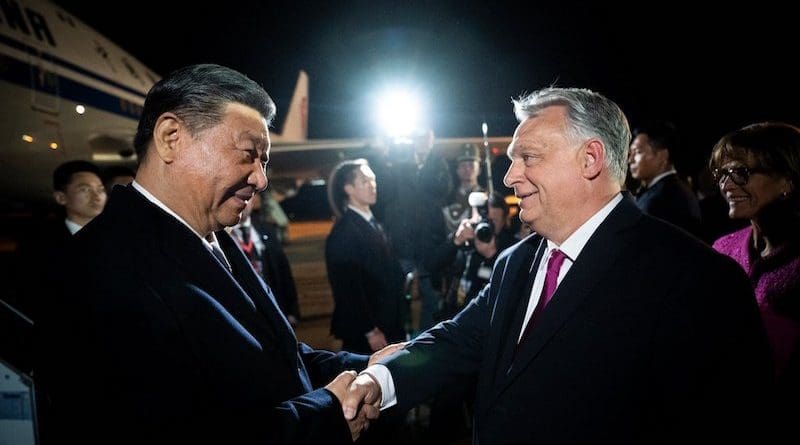China’s Xi Arrives In Hungary For Orban Meeting, Next Leg Of European Charm Trip
By RFE RL
(RFE/RL) — Chinese President Xi Jinping, fresh off an apparently successful trip to Serbia, on May 8 arrived in Hungary, where he is scheduled to meet later in the night with another authoritarian leader — Prime Minister Viktor Orban — and where he’ll likely receive another warm welcome.
Chinese state television said Xi arrived in Budapest “by special plane and began his state visit to Hungary, at the invitation of Hungarian President Tamas Sulyok and Prime Minister Viktor Orban.”
Xi left Belgrade on May 8 after meeting there with Serbian President Aleksandar Vucic at a city palace where thousands of people were gathered to greet them as both men lauded their countries’ friendship as “ironclad” and issued a joint statement to boost cooperation toward “a common future in the new era.”
Xi is on a rare, six-day European tour that already took him to France to meet with President Emmanuel Macron and EU leaders, who urged him to ease Chinese trade restrictions and to use his influence to press Russian President Vladimir Putin to end his invasion of Ukraine.
Xi’s first trip to Europe in five years is seen as part of his drive to increase Beijing’s influence on the continent’s economic and political affairs.
The Sino-Serbian agreement signed by Xi and Vucic raises the level of their cooperation from strategic partnership to “building the community of Serbia and China with a common future in the new era.”
After a series of bilateral meetings, Vucic called it “the highest form of cooperation between the two countries.”
Xi said their countries will “jointly oppose hegemony and power politics” in the interest of “fundamental and long-term interests.”
He called their bilateral political trust “strong as a rock.”
Vucic has promoted Chinese investment and trade and diplomatic ties for his Balkan nation of around 7 million as he has sought to balance outreach to Russia and China and the bucking of Western sanctions on Russia over the Ukraine war with his country’s bid for eventual EU membership.
Speaking from a balcony of the palace, Vucic thanked Xi for visiting “little Serbia” and said they were “making history today even though it doesn’t seem so to many.”
Xi called it a “truly two-sided and honest friendship,” according to Serbian state television.
Like Moscow, Beijing has supported Belgrade diplomatically in its refusal to recognize former province Kosovo’s independence, while Belgrade has supported China’s claims to Taiwan. “Taiwan is China,” Vucic said on May 8, citing the UN Charter.
Xi’s visit was seemingly timed to coincide with the 25th anniversary of NATO’s bombing of the former Chinese Embassy in Belgrade in 1999, a deadly incident that has united Beijing and Belgrade in their criticism of Western intervention in the Balkans and around the world.
China has invested some $6 billion in Serbia in the past decade, putting the money into copper mines and a steel mill as well as major highway and infrastructure projects that have been criticized by some as nontransparent and overly risky deals between governments.
Chinese and Serbian officials were expected to sign more than 30 agreements in areas that Vucic suggested were in many cases aimed at boosting technology and innovation in Serbia.
Ahead of the Chinese president’s arrival, Belgrade was decorated with flags of Serbia and China, and welcome messages were set up along the route from the airport to the city center in Serbian and Chinese.
Xi also made Serbia a stop in 2016, when he signed a free-trade agreement with Belgrade that alarmed skeptics of Chinese economic and political intentions in Europe.

